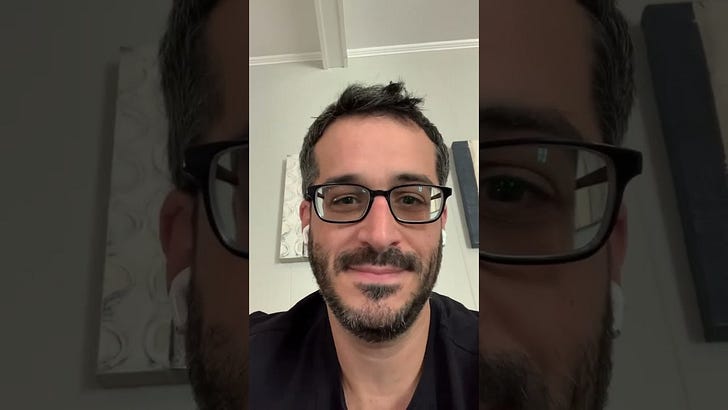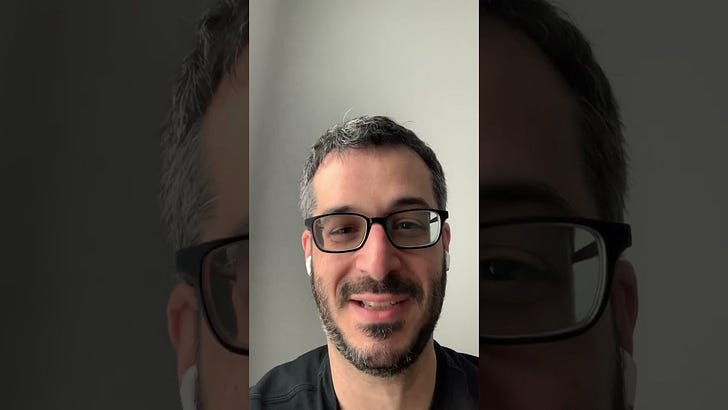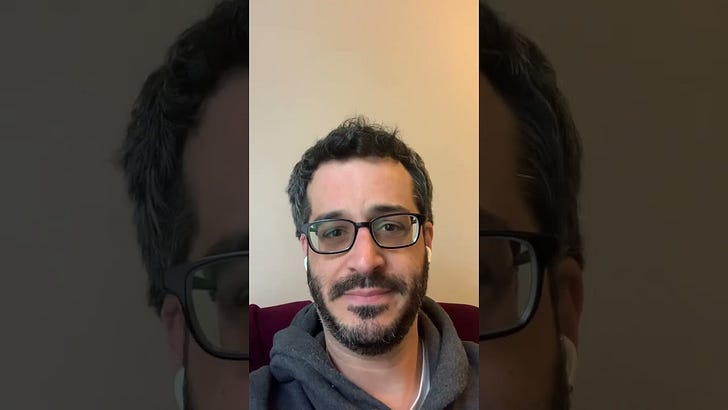In last month’s issue, I talked about monkeys, recession data, crypto market trends, and the separation of money and the state.
In this month’s issue, I’ll look at narratives and why reality matters more than facts, charts, and projections.
If you want to hear an auto-narration instead of my voice, head to the Medium version of this post!
First, let me address a thought you may have on your mind.
Why u so dumb, Mark?
Mark, in one of your weekly rundowns in January, you said that college is a Ponzi scheme and student loans are really bad investments. Are you an idiot?
Are you talking about this one?
That’s not what I said. I said anybody can make that case. The facts give you all the support you need to believe whatever you want to believe.
Even the most casual observer can see that college is a government-subsidized multi-level marketing scheme backed by trillions of dollars of entrenched interests and a whole cultural apparatus around it.
Only half of the graduates get jobs in their chosen fields of study. Some of them give up a half decade’s worth of income or more to get entry-level jobs that barely cover their basic expenses and a little bit of fun (if that).
Predatory lenders take government money to foist unaffordable debt products on young people who don’t know any better while preying on parents who so desperately want their children to have a better life, that they are willing to sacrifice their wealth and financial security so their children can make somebody else richer.
Is there any way to sustain this system other than for new people to buy into it at higher prices? Without massive government support and affinity marketing programs, how can this system survive?
What value does it serve now that we have YouTube, online academies, internships, chatGPT, the Internet, real-world life experiences, and myriad opportunities for young people to start their own businesses?
Think out of both sides of your head
That would be a cynical take that tells only half of the story.
For many people, college opens up a world of opportunities, friendships, worldviews, and real skills that can get them good jobs, strong business connections, and more fulfilling life experiences.
Colleges offer mentorship and career development opportunities that AI can’t replace and most people could never afford.
Some students can’t get these opportunities from where they live or who they know. For them, college is not only worth the cost, it’s the only way to gain access to privileged social, financial, and vocational networks.
Student loans offer better terms than anything they can get from a bank and government subsidies help lenders accept the risks and hassles that come with lending to kids.
Marginalized families and communities often have little access to credit and rarely on reasonable terms. When you don’t “know somebody who knows somebody” or you don’t look/speak/act a certain way, strangers don’t often give you money. Banks are generally no different.
Of course, if you like college, you pick one set of facts. If you don’t like college, you pick another set of facts. Whatever you want to believe, you can!
When that’s all you see, all you know, and all people tell you about, that becomes reality.
Such is the challenge we face today with cryptocurrency. A whole bunch of people got so burned and appalled by our greed, fraud, and nonsense that they chose to see a different reality than the one we see.
(And, if we’re honest with ourselves, the crypto market hasn’t exactly rewarded the most noble and aspirational behaviors.)
Let it roll off of your back
During this litigation and regulation phase of cryptocurrency’s evolution, you will hear people say things that will make you very mad.
They may make you worry that your government will do really bad things to you, your crypto, and the industry in general. They may even make you feel like you have to sell or leave the market.
Don’t argue. Don’t try to change their minds or bestow some gift of knowledge or wealth on them. Let crypto speak for itself. If it’s as good as we think it is, the message will come through. Crypto will earn its keep.
Accept other people’s skepticism. Embrace their apathy. Listen and try to understand why people can’t see the things that we see. You may find some valid points.
In any event, we need entrance liquidity to buy into the market at these low prices.
Once crypto goes “mainstream” and everybody else figures out what it’s useful for, all of the best opportunities will go to somebody richer, smarter, or better connected than we are.
Now’s our only chance to get ahead of them.
Let the lobbyists advocate for us. They know far better than you or anybody on Twitter how best to influence the political system.
Let the builders and developers show the world what good things this technology can do.
We need only to give them our time, attention, enthusiasm, and support so that they can continue to ideate, innovate, and create the financial networks of the future. They will build the reality that others will see.
Facts vs. reality
Some say this can’t happen without the US onboard. Everything depends on the US economy, financial system, stock market, and dollar.
They take this as a matter of fact.
Sometimes, facts do not reflect reality.
After Trump was elected, gun sales went down while abortions went up. Wasn’t Trump supposed to be pro-gun, anti-abortion?
After Biden was elected, oil boomed while new wind and solar projects fell (sometimes, literally). Wasn’t Biden supposed to be pro-ESG, anti-oil?
Perhaps these matters are more complicated than we think. Maybe a chart, dot plot, or political decision does not have as much predictive value as we think.
Facts are clear. Reality is messy. But that's the world we live in.
Fact: SEC says Kraken misrepresented its staking program.
Fact: Kraken decided to settle instead of contesting the charges.
Fact: Kraken can offer its staking program with proper disclosures, a structure that fits into US rules, and transparency about what it does with people’s tokens.
Fact: Kraken still offers its staking program to non-US users.
Fact: anybody in the US can stake their own crypto or another person’s crypto on their behalf.
What’s the reality?
You get to choose!
Do you want the reality where the US government hates staking and wants to destroy crypto? You can have it!
Do you want the reality where US laws suck but businesses need to comply anyway? You can have it!
Do you want the reality where staking is evil, crypto’s a scam, and Kraken runs a fraudulent business? You can have it!
Whatever you want to believe, you can believe. Better yet, you’ll always have the facts on your side!
What do I think?
Sometimes, people do whatever they want, regardless of who’s in power and what the authorities say.
We are motivated by our own needs and the needs of those around us. Often, those needs matter more than the needs of the authorities making decisions on our behalf.
Where the rules are bad, we see time, talent, money, and energy move to places where the rules are good.
Where there’s a will, there’s a way
If some other country gives people a better option for crypto, crypto will flourish in that country. The US will lose. Everybody else will win.
Why is that bad?
With crypto, we have financial systems that don’t depend on the goodwill or competence of banks and governments. We can replace their closed systems of control with free financial networks that are more secure, private, and efficient.
Shouldn’t we celebrate that?
In 2017, most US banks wouldn’t let customers deposit onto crypto exchanges. Somehow, massive amounts of money moved into crypto, anyway. China banned crypto a bunch of times, yet Chinese miners still account for as much as 20% of the hash power and Chinese accounts still move a lot of money in and out of crypto.
You may worry about what will happen if crypto loses its“fiat on-ramps” and “money super-highways.”
Those ramps and highways allow people to get money out of crypto just as quickly as they get money into it. “Fiat” rails seem like an obstacle when you want prices to go up, but they also give people a way to pull money out of crypto when prices go down.
An on-ramp makes a great entrance. Also, a great escape route.
Money for them and money for us
Frankly, I don’t mind the speculative enthusiasm. We need it! You want people to get excited and engaged. Some of them will stick around and see the reality that they’ll never find on Twitter, Reddit, or Bloomberg.
Cryptocurrency is money for the people, not the institutions. It’s money for you and me, not governments and investment funds.
Maybe we should keep crypto separate from the wider world.
Let others use the technology for permissioned gatekeeping, CBCDs, and private blockchains. They can figure out lots of ways to squeeze profits from the technology.
Let us have DeFi, NFTs, distributed data storage platforms, and all the things that are being built with cryptocurrency that are impossible to deliver using legacy financial technology.
These networks will make finance more accessible and affordable for the poor and disenfranchised. On top of that, they will enrich users with a share of transaction fees, staking rewards, token delegations, and other benefits that grow their networks for the good of everybody who participates.
Let hackers and frauds assault our protocols until they’re robust and resilient. Our gains will be more durable. Our wealth will be more difficult for others to confiscate or dilute. Our money will be more resistant to attack and manipulation.
Bureaucrats and corporations can have their money. We’ll have ours. Capital will flow to whichever system can best serve the needs of those who use them.
The forever bear market
Mark, that can’t happen in a bear market. Macro, bro!
As long as bitcoin’s price stays above $15,600, we’re in a literal bull market, even if it doesn't feel that way.
Fact: since May 2022, we have seen the market show the same behaviors as it did in 2011, 2015, and 2018-2019.
Fact: premium subscribers saw this play out in real-time through regular market updates and analysis from this newsletter.
Fact: in 2011, 2015, and 2018-2019, we had “macro” problems. European debt crisis in 2011. Chinese stock market and currency crisis in 2015. Technical bear market for the S&P 500 and signs of stress in the US banking system in 2018-2019.
Fact: many countries show strong economic growth and favorable demographics (just maybe not your country).
Reality?
There is always something to worry about.
Bitcoin acts the same way at market bottoms, regardless of the “macro” or “liquidity.” Altcoins follow wherever bitcoin goes.
You can debate bull and bear markets. You can choose your reality as you choose your facts. But you can’t deny the circumstances.
You are here:
For the past nine months, we’ve seen the evidence get more compelling. We put together more pieces of the puzzle with each passing week.
The market always knows better than you do
There are only two realistic scenarios for this market. It’s not worth getting into now, but I touched on this in my February 21, 2023 update.
What should you do about it?
For me, that means following my plan.
Three lines on a chart tell you when to buy and two signals tell you when to sell. Ride prices up and down, sell only when the market forces you to do so, and buy only when the markets give you a great opportunity.
If you're following the plan, you're up as much as 325% or down as much as 55% but probably about even on your investment. Now, you're saving money for the next opportunity, which could come before you even read this issue.
Do you want a simple way to get free money while you wait, for the same risk you take holding cash? Some ideas:
Get free crypto with Rodeo Money for buying things you already buy. Use my page—I pass all of my commissions to you.
Stack sats with the Fold card. Use my referral link—you get some free bitcoin and chances to win more.
Stake or delegate your altcoins for free tokens. Start with CoinGecko and StakingRewards.com for more information.
Work for any of the businesses that you see in the “Jobs Corner” of my weekly rundowns.
Fool around with the platforms I mentioned in my airdrop reports. Some are easy, some are hard, and all come from legitimate and experimental projects. While I can't guarantee you'll get an airdrop from any of these, you can follow my step-by-step instructions so you’re the most likely to qualify if they do.
For paid subscribers, I'll keep looking at the on-chain data, technical patterns, order books, macro, and changes in behavior and metrics so you can make the most of this market.
Mark, don’t look at charts and data, that’s just astrology for men!
Sure, if you use them in that way.
You can choose to jump to conclusions from bad on-chain analysis, arbitrary fractals, dubious data models, and the squiggles some traders draw on a price chart.
You could also look at human behavior, which you'll find reflected in data and technical analysis, if you try not to read too much into it.
Also, consider listening to guidance and commentary from people like me and others in this space. Start with the publications on my recommendations list.
They’re all going to laugh at you
Experts may laugh at our technical indicators, on-chain metrics, and observations of human behaviors.
Are they really doing anything different when they cite the Case-Shiller index, CPI reports, FRED charts, and their own proprietary analysis?
US Federal Reserve Chairman Jay Powell has decades of experience and access to the best data on earth, and still people doubt and second-guess him.
If you listen closely, even he admits he does not have enough information for a strong conviction, no matter how it's held.
The US spent over a decade with the loosest monetary policy ever recorded and barely got any inflation in the real economy. Now, with the tightest monetary policy in at least 15 years, it can’t get inflation back to where it was.
The Fed wants 2% inflation to match that of the 2010s, a decade of sluggish growth.
Why choose that target? During the 1990s, the US had its greatest economy ever—and spent only one year below that 2% inflation level (it averaged +3% for the decade).
Is it any wonder the brightest economic minds of our generation can’t make sense of what’s going on?
If you’re listening to the macro analysts, what makes you think they know any better than any of these financial experts? Are you certain that you want to put so much faith in any of these people?
You want to know what happens next, but you might not need to. Maybe you can do ok in crypto without the certainty of “calls,” theories, and predictions? Who knows what you might learn from analysis, reflection, insights, and commentary, or an honest and ambivalent reading of market data?
Not today, my friend
I know so many people with cash on the sidelines, waiting for “the macro” to improve, Tether to implode, Binance to collapse, the US to finish cracking down on crypto, or some other reason to get into the market.
Aunt Sally and Uncle Morton sold in October 2021. They’ll buy some from their financial advisor in 2025, but that doesn’t help you now.
Samantha Down the Street decided to stop her monthly auto-buy because her boyfriend said “Fed is raising rates and there’s too much resistance at the 200-week moving average, whatever that means.”
At the end of December, Billy the Neighbor sold his Tesla stock at a 60% loss to “avoid the crash.” Tesla stock is up 80% since then but he’s still out of the market because “it’ll go back down. Macro, bro!”
Priya in the Park says we’re going to have a recession. Now, Tony on the TV is interviewing gold bugs and crypto haters, nary a laser eye in sight.
I know people who rearranged their portfolios last year to lock in 30% losses. They expect financial assets will drop.
They’re all correct. But when? What price? How high will the market go before it crashes? How far will it fall once it does? What will you lose while you wait for that to happen? How will you know when it’s “safe” to buy again?
Safe as in “good” or safe as in “normal?”
Whether or not we get a recession and stock market crash, we can expect to see better deals on pretty much anything that is traditionally financed—e.g., cars, houses, large appliances, construction bids, and other purchases that people usually make with borrowed money.
Over the next six months, this will become more obvious. We know things will get worse before they get better.
The question is how much worse and for how long?
We’ll see. Markets are not that simple.
Recent history is spotty about how this plays out for investors:
For most of the 1970s, we had multi-year Yo-Yos in the prices of commodities, goods, and financial assets.
In 1982, we had a steep, short recession without much of a drop in the stock market (it was already in a big downtrend after a harsh 1970s).
In 1990, we got a correction in the housing market along with a big rise in unemployment, but the stock market went up (minus a hiccup from an oil crisis).
In 1995, we got a mild lull for unemployment, inflation, and GDP within a larger expansion.
In 2001, we got a brief, mild recession with a big drop in the stock market.
In 2007, we got a deep, long recession punctuated by a global financial crisis.
It’s hard to unwind a 20-year monetary pump with a 12-month rug pull. The Fed will have to try harder.
Will it succeed?
With every dollar saved on a new home, every penny saved on a car payment, and every rebate on a new washing machine or water heater, you get a little extra money to put towards something else. China’s reopening means more supplies of goods and stimulus for the global economy.
Almost none of those gains will go into the crypto market, but we don’t need much. Just enough to push prices higher for long enough that people think prices will keep going higher.
Everything else will take care of itself.
You are the money that you seek
If you’re following my plan, you don’t have to worry. You win whichever way the market goes.
Some say you’re getting REKT with crypto, but not me. Thanks to 2022, many people have more cryptocurrency now than they ever had before.
Does that mean they’re REKT?
I guess it depends on what you wanna get out of this market.
If you want an easy way to build wealth, you’re not getting REKT at all.
It’s hard to build a portfolio when prices start going up. With each passing day, you pay more for a smaller return.
If you want to make more of your government’s money, learn to trade, sell your couch, pick up an extra job, get a promotion, buy bonds (preferably T-bills), or whatever works best for you.
Then, as you have some money to put into this market, put it in. If you follow my plan, you’ll get better results than bad traders and people who dollar cost average, but worse results than good traders.
Bonus?
You’ll have a stake in the financial networks of the future.
Worry about rising interest rates, but also remember the opportunities they create.
Is it so terrible if we went back to a world where to make money, you have to produce something other people want and sell it for a price they’re willing to pay—rather than borrow cheap money from private funds until you can dump your equity on the market in exchange for cash?
With the profit you make from your productive economic activity, is it so bad to put a portion of those profits into speculative assets?
When these assets grow, are we so spoiled that we can’t let others share a portion of our good fortune as they buy their own stakes in these new financial networks?
Can’t we encourage others to see the reality that we see:
A technology that, if properly developed, can revolutionize the way humans create, distribute, and protect wealth in a way that benefits everybody, not just those who have access to those privileged social, financial, and vocational networks I talked about at the beginning of this post.
In doing so, is it so terrible if we make a better life for ourselves and those we care about?
Relax and enjoy the ride!














